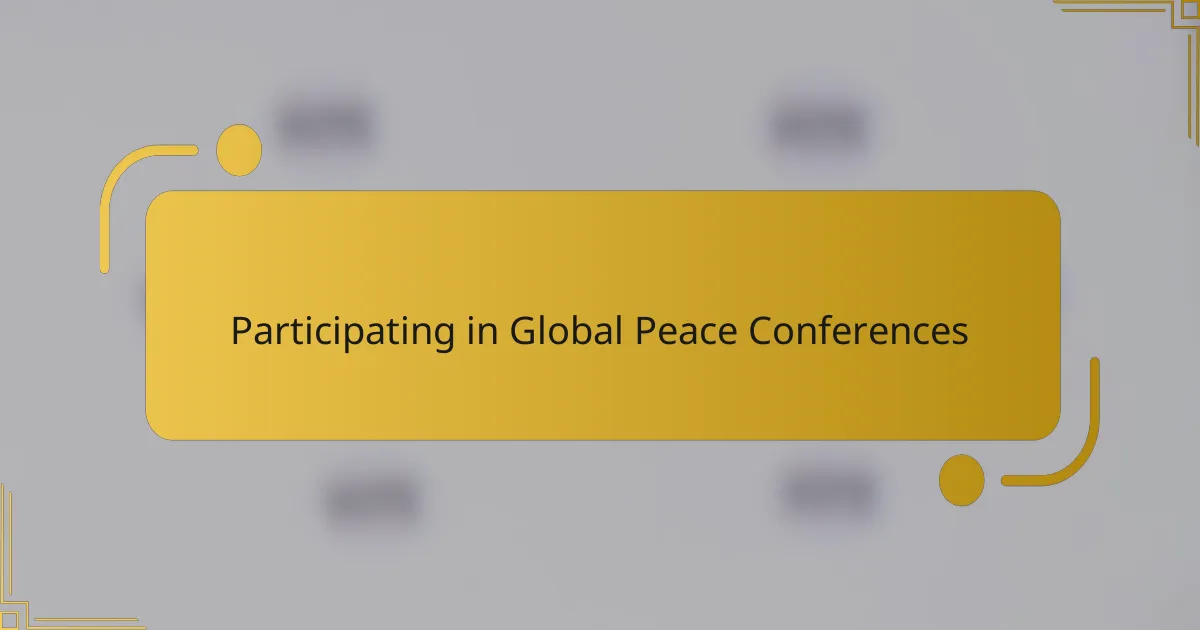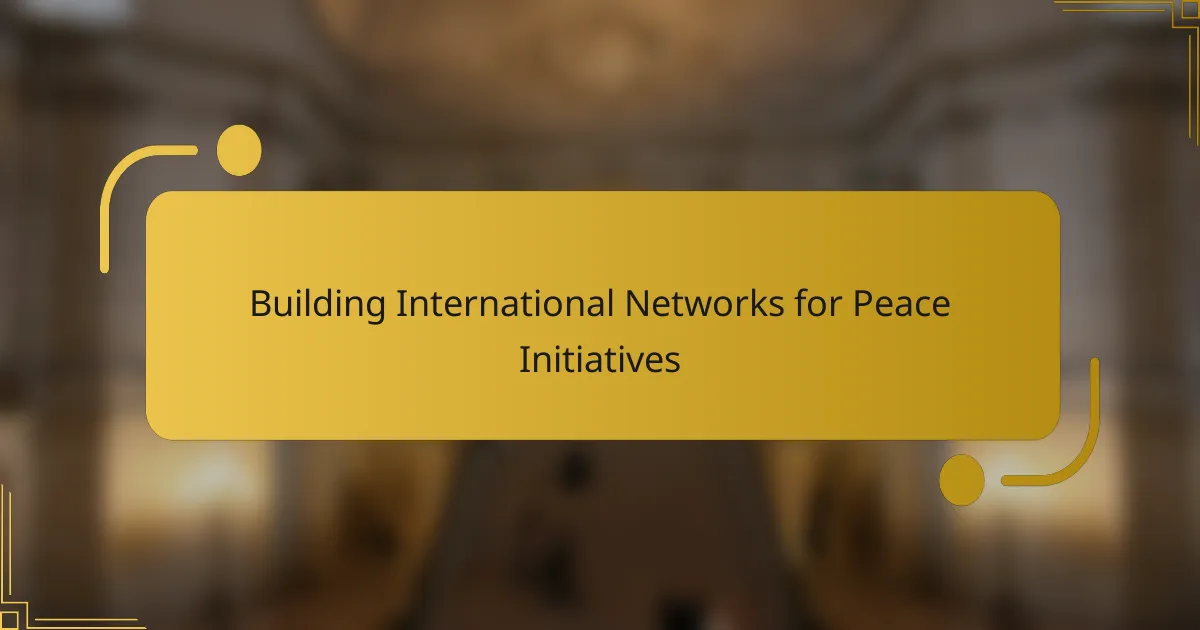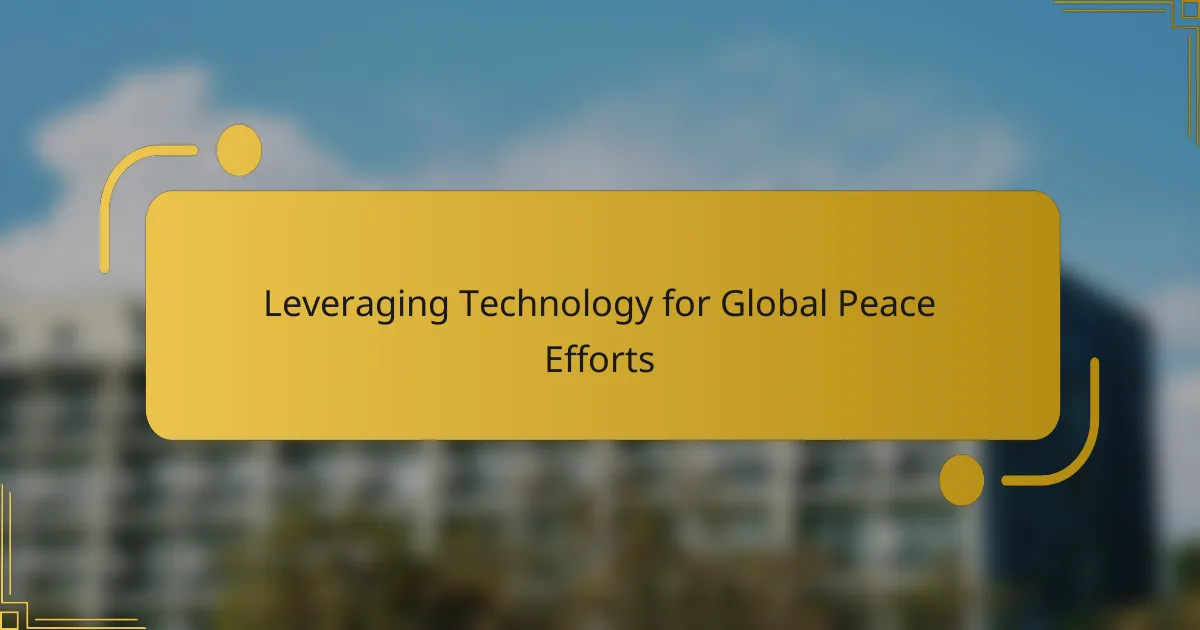Participating in global peace conferences is a valuable opportunity to engage with individuals and organizations dedicated to fostering peace worldwide. These events not only enhance your understanding of international relations but also provide a platform for networking and collaboration on peace-building initiatives. By attending, you can gain specialized knowledge and connect with like-minded individuals committed to making a difference.
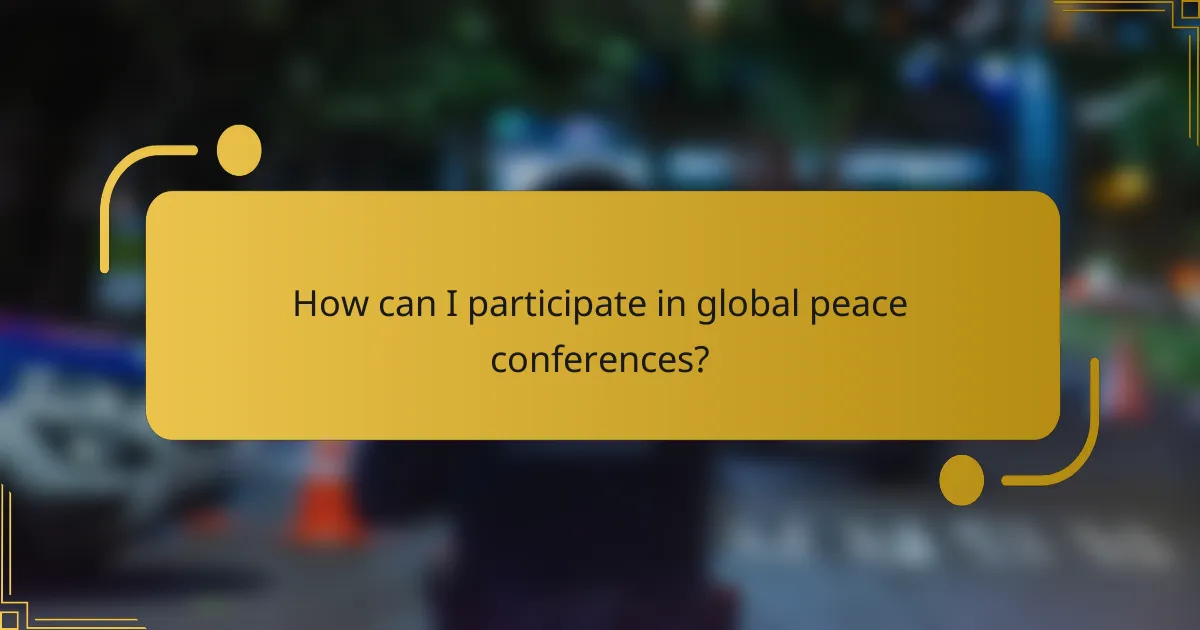
How can I participate in global peace conferences?
Participating in global peace conferences involves registering for events, joining relevant organizations, and engaging with local initiatives. These avenues provide opportunities to connect with like-minded individuals and contribute to peace-building efforts worldwide.
Register for events like the United Nations Peace Conference
To participate in events such as the United Nations Peace Conference, you typically need to register online through the official UN website or the event’s dedicated page. Registration may involve filling out a form and paying a fee, which can vary based on the event and your affiliation.
Keep an eye on deadlines for registration, as they can be several months in advance. Early registration often provides benefits like reduced fees and guaranteed access to workshops and sessions.
Join organizations such as the International Peace Bureau
Joining organizations like the International Peace Bureau (IPB) can enhance your involvement in global peace efforts. Membership often includes access to resources, networking opportunities, and updates on upcoming conferences and initiatives.
Membership fees for organizations like the IPB can range from nominal amounts to higher contributions based on your income or organizational status. Engaging with these groups can also provide valuable insights into effective peace advocacy strategies.
Engage with local peace initiatives in major cities
Engaging with local peace initiatives in major cities is a practical way to contribute to peace efforts. Many cities have grassroots organizations that focus on conflict resolution, community building, and educational programs aimed at promoting peace.
Look for local events, workshops, or volunteer opportunities through community centers or social media platforms. Participating in these initiatives can help you build connections and gain practical experience in peace advocacy.

What are the benefits of attending global peace conferences?
Attending global peace conferences offers numerous benefits, including enhanced networking, access to specialized knowledge, and exposure to varied perspectives on peacebuilding. These events facilitate collaboration among individuals and organizations dedicated to fostering peace worldwide.
Networking opportunities with global leaders
Global peace conferences provide a unique platform to connect with influential leaders, policymakers, and activists from around the world. Engaging with these individuals can lead to valuable partnerships and collaborative projects aimed at promoting peace.
To maximize networking, prepare a concise introduction about yourself and your work. Attend social events and breakout sessions where informal discussions often lead to meaningful connections.
Access to exclusive workshops and panels
Participants at peace conferences often have the chance to attend specialized workshops and panels that delve into current peacebuilding strategies and challenges. These sessions are typically led by experts and provide practical insights and tools that can be applied in various contexts.
Consider prioritizing workshops that align with your interests or areas of expertise. Engaging actively in discussions can enhance your learning experience and help you gain new skills relevant to your peace initiatives.
Exposure to diverse perspectives on peacebuilding
Global peace conferences attract participants from various cultural, political, and social backgrounds, offering a rich tapestry of viewpoints on peacebuilding. This diversity fosters a deeper understanding of the complexities involved in achieving peace.
Listening to different perspectives can challenge your assumptions and inspire innovative approaches to conflict resolution. Be open to engaging with ideas that may differ from your own, as this can lead to more effective strategies in your peace efforts.
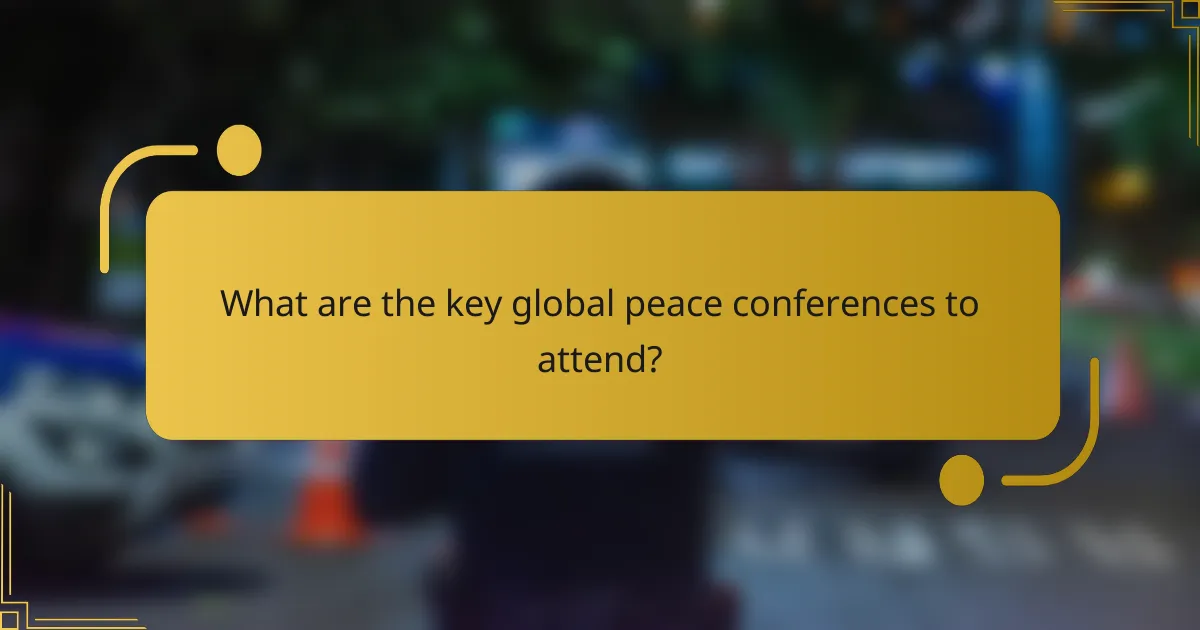
What are the key global peace conferences to attend?
Key global peace conferences provide vital platforms for dialogue, collaboration, and action towards peacebuilding. Attending these events can enhance your understanding of international relations and offer networking opportunities with influential figures in peace efforts.
World Summit of Nobel Peace Laureates
The World Summit of Nobel Peace Laureates gathers Nobel Prize winners and peace advocates to discuss pressing global issues. This conference typically includes panel discussions, workshops, and networking sessions, focusing on themes like conflict resolution and social justice.
Participants should prepare to engage with diverse perspectives and consider how their own work aligns with the summit’s goals. It’s beneficial to review past summits to understand recurring themes and influential speakers.
Global Peace Conference in Geneva
The Global Peace Conference in Geneva serves as a hub for international dialogue on peace and security. It attracts diplomats, NGOs, and scholars who share insights on conflict prevention and peacebuilding strategies.
Attendees should be ready to participate in discussions that may influence policy decisions. Familiarizing yourself with the conference agenda and key speakers can enhance your experience and networking potential.
Annual Peace and Security Forum in New York
The Annual Peace and Security Forum in New York focuses on the intersection of peace and global security issues, often featuring representatives from the United Nations and various member states. This forum addresses current conflicts and strategies for sustainable peace.
To maximize your participation, consider preparing questions or topics for discussion that align with the forum’s objectives. Understanding the UN’s current peace initiatives can provide context for the conversations that take place during the event.
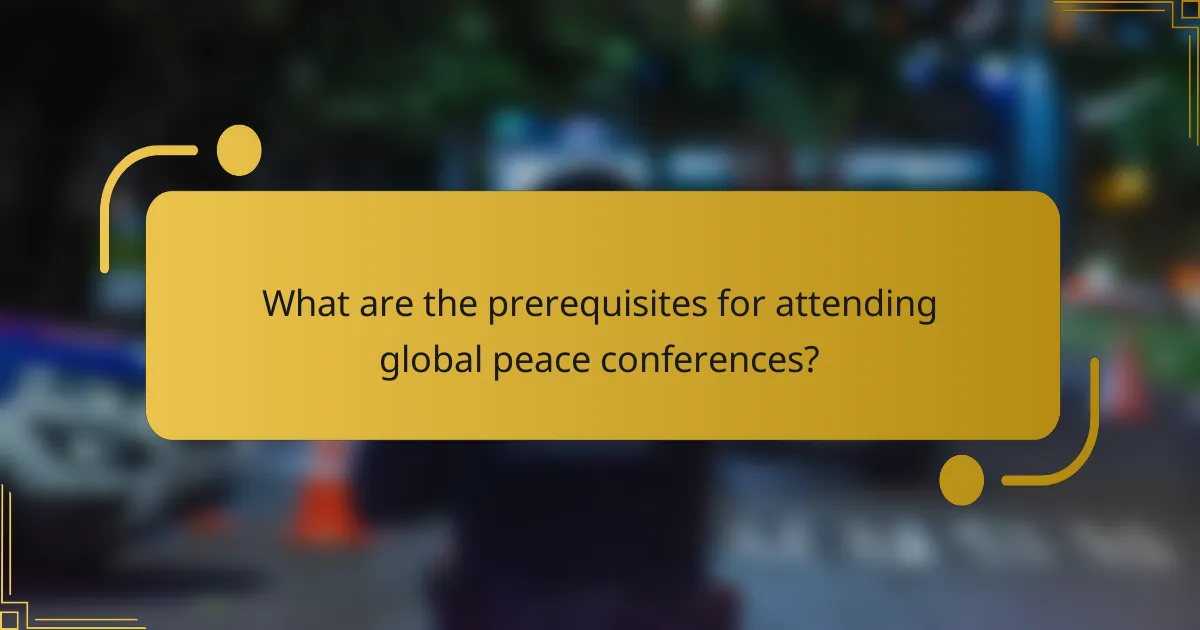
What are the prerequisites for attending global peace conferences?
To attend global peace conferences, individuals typically need to be affiliated with recognized peace organizations and submit relevant proposals or papers that align with the conference’s themes. These prerequisites ensure that participants are engaged in meaningful dialogue and contribute to the conference’s objectives.
Membership in recognized peace organizations
Being a member of a recognized peace organization is often essential for participation in global peace conferences. These organizations, such as the United Nations Association or local peace advocacy groups, provide credibility and a network of support. Membership can also offer access to resources and information about upcoming conferences.
To become a member, individuals may need to fill out an application, pay a membership fee, and demonstrate a commitment to peace initiatives. It is advisable to research various organizations to find one that aligns with your values and goals.
Submission of relevant proposals or papers
Submitting a proposal or paper that addresses the themes of the conference is a critical step for attendees. These submissions should reflect current issues in peacebuilding, conflict resolution, or related fields. Many conferences have specific guidelines regarding the format and content of submissions, so it is important to adhere to these requirements.
Proposals typically include an abstract, objectives, and a discussion of the expected impact. It is beneficial to highlight unique perspectives or innovative solutions in your submission. Deadlines for submissions can vary, so keeping track of these dates is crucial to ensure participation.

How do global peace conferences influence policy?
Global peace conferences play a crucial role in shaping international policy by facilitating dialogue among nations and fostering collaboration on peace initiatives. These gatherings often lead to the establishment of frameworks that guide national and international actions toward conflict resolution and peacebuilding.
Recommendations to national governments
National governments are encouraged to actively participate in global peace conferences to align their policies with international peace efforts. This includes adopting recommendations made during these events, such as enhancing diplomatic relations and investing in conflict prevention strategies.
Governments should also prioritize transparency and inclusivity in their peace processes, ensuring that diverse voices, including those of marginalized communities, are represented. This can enhance the legitimacy of their policies and foster broader public support.
Creation of international peace treaties
Global peace conferences often serve as a platform for negotiating and drafting international peace treaties, which are essential for formalizing commitments to peace. These treaties can address various issues, from arms reduction to human rights protections, and are crucial for establishing legal frameworks that hold nations accountable.
For effective treaty creation, it is important to involve a wide range of stakeholders, including governments, NGOs, and civil society. This collaborative approach can help ensure that treaties are comprehensive and address the root causes of conflict, increasing the likelihood of successful implementation.
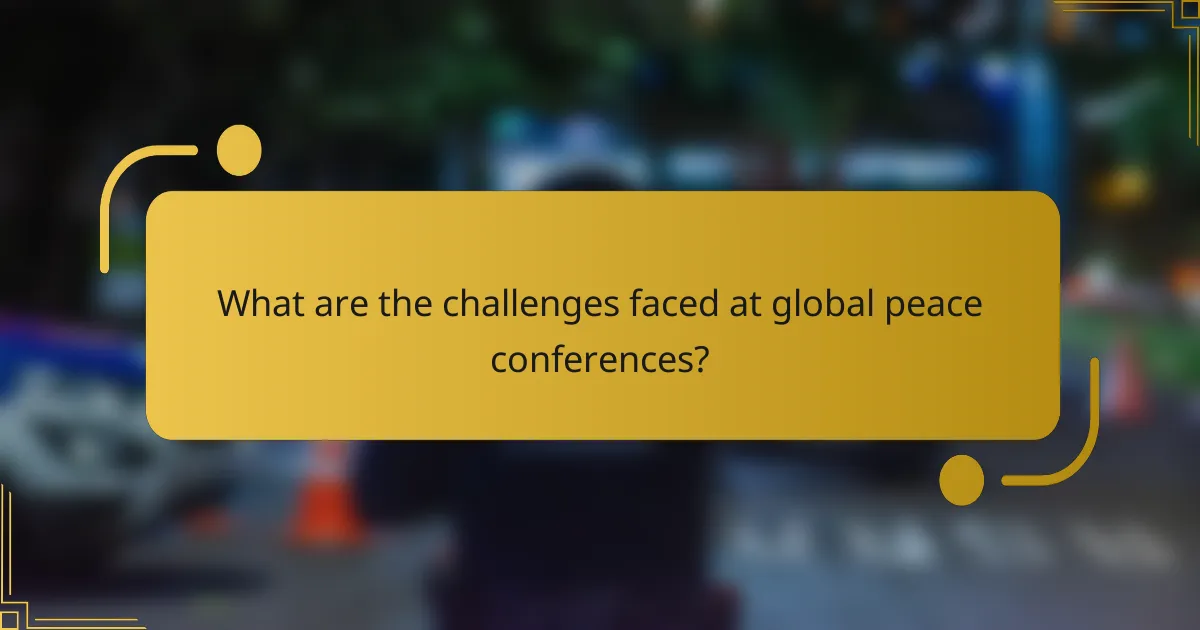
What are the challenges faced at global peace conferences?
Global peace conferences encounter several challenges that can hinder effective dialogue and resolution. Key issues include political disagreements among nations and the complexities of resource allocation for peace initiatives.
Political disagreements among nations
Political disagreements among nations often stem from differing national interests, historical conflicts, and varying ideologies. These disagreements can lead to gridlock, where no consensus is reached, delaying or derailing peace efforts.
For example, countries may have conflicting views on territorial disputes or human rights issues, making it difficult to find common ground. To navigate these disagreements, diplomats must engage in active listening and compromise, focusing on shared goals rather than divisive issues.
Resource allocation for peace initiatives
Resource allocation for peace initiatives is another significant challenge at global peace conferences. Limited funding and competing priorities can restrict the implementation of proposed solutions, leading to ineffective programs.
Countries often have to decide how to distribute financial resources, which can lead to tensions, especially if some nations feel their needs are overlooked. Establishing clear criteria for funding and prioritizing initiatives based on urgency and potential impact can help mitigate these challenges.
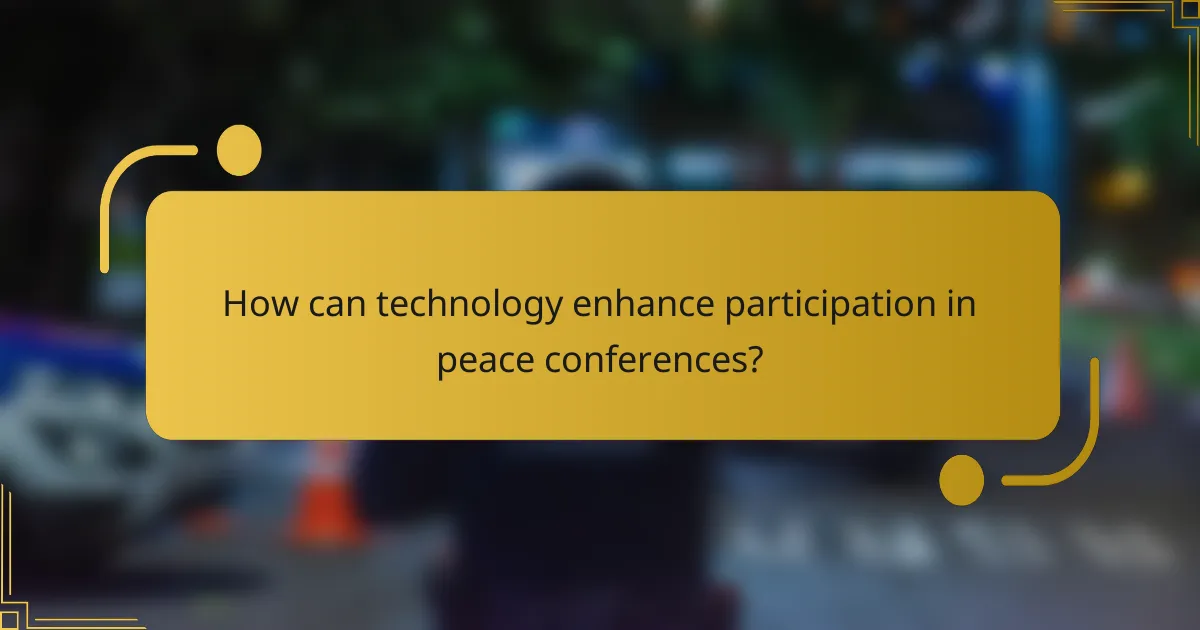
How can technology enhance participation in peace conferences?
Technology can significantly enhance participation in peace conferences by enabling remote access, facilitating real-time communication, and providing platforms for collaboration. These advancements allow a broader range of stakeholders to engage, share ideas, and contribute to discussions regardless of their physical location.
Virtual attendance options for remote participants
Virtual attendance options, such as video conferencing tools and live streaming, allow remote participants to join peace conferences from anywhere in the world. Platforms like Zoom, Microsoft Teams, and Webex provide features for real-time interaction, enabling attendees to ask questions and participate in discussions as if they were physically present.
When considering virtual attendance, it is essential to ensure reliable internet connectivity and familiarity with the chosen platform. Organizers should provide clear instructions and technical support to help participants navigate any potential challenges. Additionally, recording sessions can be beneficial for those who cannot attend live, allowing them to catch up later.
To maximize engagement, organizers can incorporate interactive elements such as polls, Q&A sessions, and breakout rooms. These features encourage participation and help maintain the interest of remote attendees, fostering a more inclusive environment for all participants.
